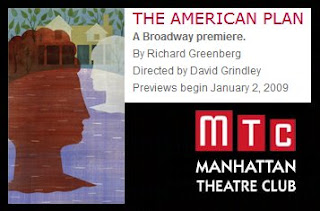

It's difficult to guess what prompted The Manhattan Theater Club to revive Richard Greenberg's The American Plan after eighteen years. It was previously produced (rather well) by them in 1991. Judging by the average age of their audience, we can assume many of the subscribers have already seen it. Although it is a strange and baffling play, it has many moments to relish (while others make you cringe).
Playwrights, particularly good ones like Greenberg, can be relied on to invent a plot in which a revelation is calculated to take us and certainly the characters by surprise. It is disheartening, however, to hear an audience audibly groan when that moment occurs. This is called the gimme-a-break moment. It happens late in Act I and results in the audience becoming actively alienated from what had previously been a rather compelling story about some very mysterious people.
Currently represented on Broadway with his excellent revision of the book for the musical Pal Joey, Greenberg has written a number of plays, including Eastern Standard, Take Me Out, The Dazzle and Three Days of Rain, that support the consensus that he is a darn good playwright. All his plays are known for intriguing dramatic content, clever dialogue and their elements of mystery -- not a bad combo. The American Plan, in particular, has a darkly romanticized edge that makes it unique in his canon. It's hard to pinpoint exactly what it is that goes seriously wrong in David Grindley's staging, but it has partly to do with the way the entire production seems to unravel incrementally as it progresses. The cast is strong, but the production/scenic design by Jonathan Fensom is annoyingly distracting. More about this later.
Nick Lockridge (Kieran Campion), a good-looking, Protestant is discovered trespassing in the Borscht belt
of all places. Having wandered and taken a swim beyond the unmarked boundaries of the Catskill mountain resort where he is vacationing, he finds himself on other people's property. Whether he becomes entangled in the lives of others by his own design or is entrapped by his own destiny is a question that is not quite as oblique as it sounds.
It is the summer of 1960, and another season in which Lili Adler (Lily Rabe), a very pretty, super-sensitive highly neurotic young Jewish heiress; Eva (Mercedes Ruehl), her overly protective mother; and Olivia (Brenda Pressley), the equally watchful maid, are in summer residence at their resort-situated home. The attentive, yet decidedly non-kosher Nick claims to be a writer for Time Magazine. But is he a knight errant WASP to the rescue or the black prince with a chink in his armor? Lili, whose violent bursts of incapacitating paranoia keep her, as she readily admits, "pre-occupational," makes, through an outrageous fabrication, a desperate romantic claim on him. A wealthy and scrupulously manipulative widow, Eva is a survivor of the Holocaust who may not actually be a witch but nevertheless wields a particularly persuasive psychological wand over her daughter. Lili is oddly both submissive and rebellious in the light of Eva's reaction to the suspiciously welcomed gentleman caller. Is this Rapunzel in the tower, or just a real nut case on the loose? And just consider the way that the gently condescended to servant/companion Olivia abets Eva, even as she herself appears to be a repository of suppressed secrets. Greenberg gets the play's dramatic juices running early by giving each character more than enough wit to chew on, and giving the audience enough enigmatic rope with which to hang its curiosity. Greenberg allows his cauldron of enigmas to simmer tantalizingly without bubbling over with too much of his incomparable gift for funny dialogue. And just when you think you might guess where things are going, another attractive stranger, Gil Harbison (Austin Lysy), enters the forest domain to further spark an already smoldering brew of lies, deceptions and misalliances. What Gil does bring with him is presumably calculated to be a blast of chilling, if regrettable, truth. In fact, this is the point where the play stumbles and never fully recovers.
While we can't complain that Greenberg doesn't give his characters a past and a present that is as taunting as their future (the play ends in the Adler's Central Park apartment 10 years later), it is the device he uses as the engine of change that fails to ignite.
Ruehl, an extraordinarily fine actor who most recently appeared to idiosyncratic advantage in Edward Albee's The Occupant, affects a keen German accent that is mostly intelligible. As a doting mother and a lady of mystery who "must pay for a corrupt and sporting youth," her performance is ripe with enigmatically suggestive behavior, all of which is cloaked in a kind of resourceful grandeur.
As Nick, Campion gives a persuasive performance that excellently conveys Lili's description of him "You look like nothing ever happened to you." Rabe is, as Nick sees her "charming and mercurial," but also perhaps a bit too flakily scary, as well. As Olivia, Pressley manages to keep us guessing about her to the very end. There is no guessing about Gil, as played nicely by Lysy, who has the task of delivering the past.
To evoke the dark, dense and very green forest setting, designer Fensom uses painted traveling curtains that are frequently on the move as is a wooden dock that also revolves to indicate a different place on the lake. As a result, Grindley's direction looks choppy and at times insupportably lost in the woods. He did a much better job two years ago also delivering a play from the past (Tony award-winner for Best Revival, Journey's End).
Perhaps because The American Plan is often as intriguing as it is frustrating in its resolve, and that we see elements that are present in The Light in the Piazza and The Heiress, we are able to understand Greenberg's disconsolate theme, as expressed by Lili: "Happiness exists . . .for other people."
